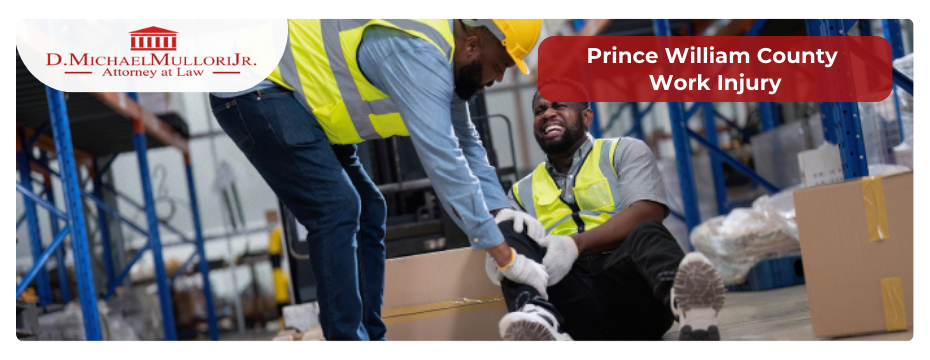
Did you recently suffer a work injury or illness in Prince William County, Virginia? You might be worrying about medical bills, struggling with income losses, and wondering how you’ll stay afloat while you’re unable to work. If so, don’t lose hope. Get help from D. Michael Mullori, Jr., Attorney at Law.
As your advocate, Mike Mullori will personally get to know your case, communicate with you frequently, and fight relentlessly for the benefits you are owed. Don’t let the burdens of medical expenses, lost income, and unnecessary stress undermine your recovery. Experience the Mike Mullori difference by reaching out or calling (703) 762-2142 today for a free initial case evaluation. Our office is conveniently located at 2500 Hunter Place, Suite 102. Woodbridge, VA.
Should I Hire a Work Injury Attorney After a Job Injury?
Yes. Hiring an attorney after a job injury is beneficial. Workers’ compensation laws are complex, and the claims process is difficult to manage on your own, particularly when you’re already dealing with the stress and pain of a work injury. An attorney can guide you through this process and handle every aspect of your claim while you focus on your recovery. In addition, an attorney who handles work injury cases will know how to assess and prove a third party was negligent.
What Does Prince William County Workers’ Compensation Cover?
Here’s a brief overview of what workers’ compensation benefits could cover if you suffer an occupational injury or illness in Prince William County, Virginia:
Medical Benefits
If your claim is approved, your employer or their insurance carrier is typically responsible for all authorized and necessary medical care related to your injury. This includes the costs of:
- Visits to authorized primary care doctors
- Visits to specialists
- Hospitalizations
- Physical therapies
- Medical tests
- Prescription medications
- Prosthetic devices
- Medical travel to authorized providers
Lost Wages
If you can’t work due to your injury, you could be entitled to one or several types of disability benefits that replace a portion of your lost wages:
- Temporary Total Disability (TT) Benefits – If your doctor confirms that you can’t work because of your injury, you could claim benefits worth up to two-thirds of your regular income (based on your earnings from the 52 weeks prior). Virginia sets minimum and maximum limits for these benefits, which change each year based on factors like the cost of living.
- Temporary Partial Disability (TP) Benefits – If your doctor permits you to return to work with restrictions and you earn less as a result, you could be entitled to TP benefits. If you are eligible for TP benefits, you could receive up to two-thirds of the difference between your pre-injury average weekly income and the amount you can earn post-injury.
You can’t claim wage loss benefits for the first seven days of missed work, meaning these payments don’t begin until your eighth day of disability. However, you could claim benefits for the first seven days if your incapacity continues for more than 21 days.
Permanent Partial Disability Benefits
If your doctor determines that you have reached maximum medical improvement (MMI) and diagnoses you with a permanent impairment, you could be eligible for permanent partial disability (PPD) benefits. In this context, reaching MMI means your condition is unlikely to improve significantly with additional treatment. In that case, your doctor might assign you a permanent impairment rating, and you could be entitled to benefits based on Virginia’s Guide for Permanent Loss.
This guide outlines the number of weeks a worker can claim disability benefits for the permanent loss or loss of use of certain body parts, such as an arm, a leg, a hand, a foot, fingers, or toes. It assigns each body part a value in weeks. You can multiply your impairment rating by the relevant number of weeks from the guide, then multiply that by two-thirds of your average weekly wage to estimate the potential value of your PPD benefits.
Permanent Total Disability Benefits
If your injuries leave you permanently unable to work, you might qualify for permanent total disability (PTD) benefits. PTD benefits are usually equivalent to two-thirds of your average weekly wage at the time of your injury, subject to maximum and minimum limits set by Virginia law. You could receive PTD benefits for as long as you’re totally disabled — potentially even for the rest of your life — unless your condition improves and you can return to work.
Death Benefits
If an eligible employee dies due to a work-related condition, death benefits could cover burial expenses of up to $10,000 and reasonable transportation costs of up to $1,000 for survivors. Certain dependents, such as spouses, minor children, and children under age 23 enrolled in accredited educational institutions, could be entitled to additional benefits to replace some of the deceased workers’ income.
What Are Common Types of Workplace Injuries in Prince William County?
Work injuries can vary significantly in severity. They can range from minor scrapes that require minimal medical intervention to severe wounds that lead to permanent disabilities or even fatalities.
Here are some common types of workplace injuries:
- Slips, trips, and falls
- Overexertion injuries
- Repetitive strain injuries
- Machinery accidents
- Transportation accidents
- Falling object injuries
- Burns and scalds
- Electrical shock injuries
- Toxic exposure injuries
- Cuts and lacerations
- Workplace violence injuries
- Stress-related injuries
What’s the Difference Between a Workers’ Compensation Claim and a Third-Party Claim?
When it comes to workplace injuries, there are two key types of claims you might hear about: workers’ compensation claims and third-party claims.
- Workers’ Compensation Claims – These are claims you file directly with your employer’s workers’ comp insurance. Most employers are required to provide workers’ comp insurance to cover employees in case they get hurt or sick on the job. As an eligible employee, you can file a workers’ comp claim regardless of who was at fault for your injury or illness in most situations.
- Third-Party Claims – You might have a third-party claim if you aren’t eligible for workers’ comp or if someone other than your employer or co-worker (a “third party”) is liable for your condition. A third-party case could be an insurance claim or a personal injury lawsuit you file in civil court. The compensation you can get from a third-party claim can cover more than just medical costs and a portion of lost wages. A successful third-party claim could provide full wage replacement compensation and money for subjective losses like pain and suffering, which are generally not covered by workers’ comp.
Can I Sue My Employer for a Prince William County Work Injury?
Typically, you can’t sue your employer for a work injury if you’re eligible for workers’ compensation. This is because the workers’ compensation system is designed as an “exclusive remedy.” This means it provides benefits regardless of fault, but in turn, employees generally can’t sue their employers for negligence. However, there are exceptions depending on the specifics of the case, such as if your employer acted intentionally to harm you.
Common Third-Party Work Injury Cases
Here are some common scenarios where third-party work injury cases could arise:
- Defective product or equipment injuries
- Work-related auto accidents caused by third-party drivers
- Work-related injuries that occur on other parties’ properties
- Injuries caused by subcontractors or other individuals on job sites
- Injuries caused by faulty maintenance or repairs by an outside company
- Injuries from harmful substances or materials provided by third-party suppliers
- Construction accidents caused by contractors or subcontractors
- Injuries caused by the negligence of a third-party consultant or safety inspector
- Injuries from the actions of customers, patients, or clients



